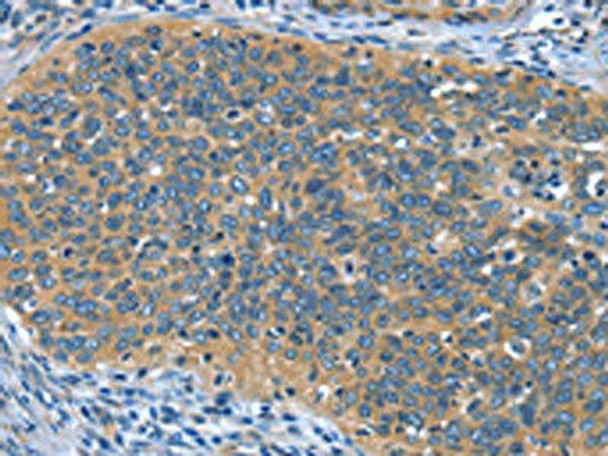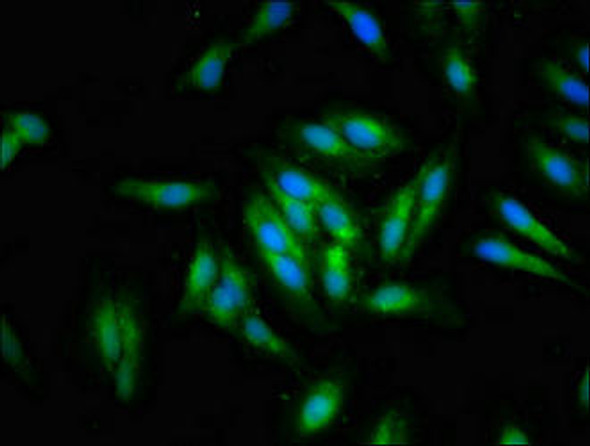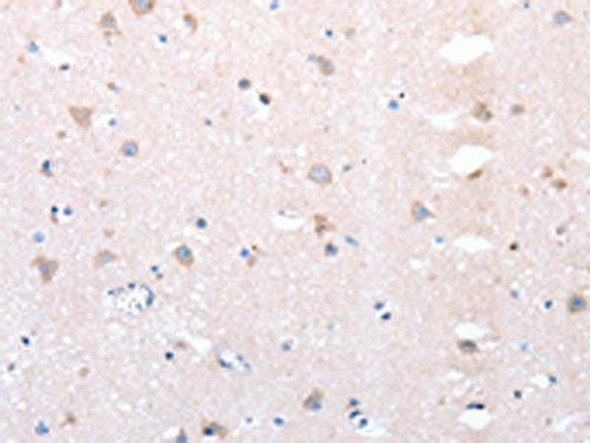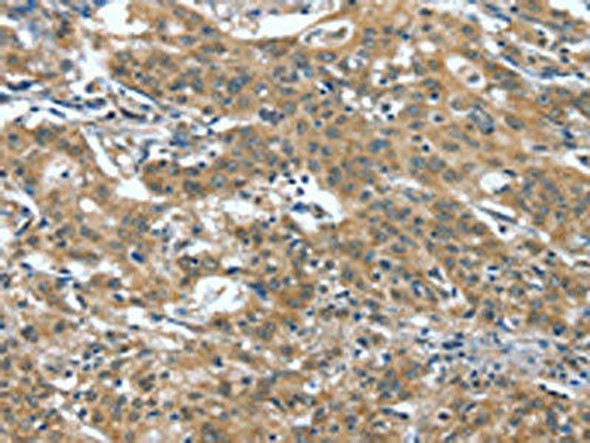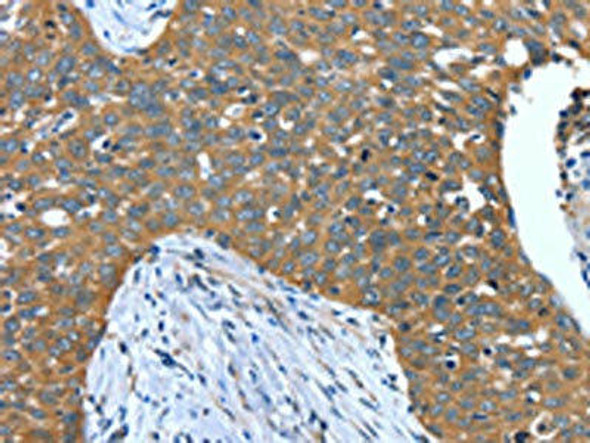Description
DTX1 Antibody (PACO19561)
The DTX1 Polyclonal Antibody (PAC019561) is a reliable tool for researchers studying DTX1, a protein involved in cell signaling pathways and immune response regulation. This antibody, generated in rabbits, demonstrates high specificity and sensitivity for detecting DTX1 in human samples, making it ideal for various research applications, including Western blot analysis.DTX1, also known as deltex E3 ubiquitin ligase 1, plays a key role in the Notch signaling pathway and is implicated in immune system modulation. By targeting DTX1 with this antibody, researchers can better understand its function in immune regulation and its potential implications in diseases such as cancer and autoimmune disorders.
The ability to detect DTX1 in different cell types enhances the versatility of this antibody for immunology and oncology studies.Overall, the DTX1 Polyclonal Antibody is a valuable tool for investigating the role of DTX1 in immune response modulation and disease pathogenesis, providing a deeper insight into potential therapeutic targets for immunological disorders and cancer.
| Antibody Name: | DTX1 Antibody (PACO19561) |
| Antibody SKU: | PACO19561 |
| Size: | 50ul |
| Host Species: | Rabbit |
| Tested Applications: | ELISA, IHC |
| Recommended Dilutions: | ELISA:1:1000-1:2000, IHC:1:25-1:100 |
| Species Reactivity: | Human, Mouse |
| Immunogen: | Synthetic peptide of human DTX1 |
| Form: | Liquid |
| Storage Buffer: | -20°C, pH7.4 PBS, 0.05% NaN3, 40% Glycerol |
| Purification Method: | Antigen affinity purification |
| Clonality: | Polyclonal |
| Isotype: | IgG |
| Conjugate: | Non-conjugated |
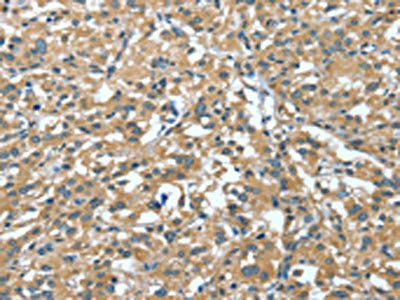 | The image on the left is immunohistochemistry of paraffin-embedded Human thyroid cancer tissue using PACO19561(DTX1 Antibody) at dilution 1/30, on the right is treated with synthetic peptide. (Original magnification: x200). |
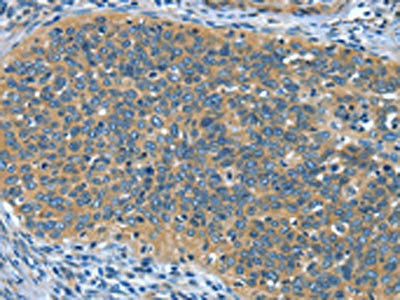 | The image on the left is immunohistochemistry of paraffin-embedded Human cervical cancer tissue using PACO19561(DTX1 Antibody) at dilution 1/30, on the right is treated with synthetic peptide. (Original magnification: x200). |
| Background: | Studies in Drosophila have identified this gene as encoding a positive regulator of the Notch-signaling pathway. The human gene encodes a protein of unknown function; however, it may play a role in basic helix-loop-helix transcription factor activity. |
| Synonyms: | deltex homolog 1 (Drosophila) |
| UniProt Protein Function: | DTX1: Functions as an ubiquitin ligase protein in vivo, mediating ubiquitination and promoting degradation of MEKK1, suggesting that it may regulate the Notch pathway via some ubiquitin ligase activity. Regulator of Notch signaling, a signaling pathway involved in cell-cell communications that regulates a broad spectrum of cell-fate determinations. Mainly acts as a positive regulator of Notch, but it also acts as a negative regulator, depending on the developmental and cell context. Mediates the antineural activity of Notch, possibly by inhibiting the transcriptional activation mediated by MATCH1. Involved in neurogenesis, lymphogenesis and myogenesis, and may also be involved in MZB (Marginal zone B) cell differentiation. Promotes B-cell development at the expense of T- cell development, suggesting that it can antagonize NOTCH1. Belongs to the Deltex family. |
| UniProt Protein Details: | Protein type:Ligase; EC 6.3.2.-; Ubiquitin ligase; Ubiquitin conjugating system Chromosomal Location of Human Ortholog: 12q24.13 Cellular Component: cytoplasm; cytosol Molecular Function:Notch binding; protein binding; transcription coactivator activity; ubiquitin protein ligase binding Biological Process: cell surface receptor linked signal transduction; negative regulation of neuron differentiation; Notch signaling pathway; regulation of Notch signaling pathway; transcription from RNA polymerase II promoter |
| NCBI Summary: | Studies in Drosophila have identified this gene as encoding a positive regulator of the Notch-signaling pathway. The human gene encodes a protein of unknown function; however, it may play a role in basic helix-loop-helix transcription factor activity. [provided by RefSeq, Jul 2008] |
| UniProt Code: | Q86Y01 |
| NCBI GenInfo Identifier: | 37077046 |
| NCBI Gene ID: | 1840 |
| NCBI Accession: | Q86Y01.1 |
| UniProt Secondary Accession: | Q86Y01,O60630, Q9BS04, |
| UniProt Related Accession: | Q86Y01 |
| Molecular Weight: | 67,368 Da |
| NCBI Full Name: | E3 ubiquitin-protein ligase DTX1 |
| NCBI Synonym Full Names: | deltex E3 ubiquitin ligase 1 |
| NCBI Official Symbol: | DTX1 |
| NCBI Official Synonym Symbols: | hDx-1 |
| NCBI Protein Information: | E3 ubiquitin-protein ligase DTX1 |
| UniProt Protein Name: | E3 ubiquitin-protein ligase DTX1 |
| UniProt Synonym Protein Names: | Protein deltex-1; Deltex1; hDTX1 |
| Protein Family: | Protein DETOXIFICATION |
| UniProt Gene Name: | DTX1 |
| UniProt Entry Name: | DTX1_HUMAN |


